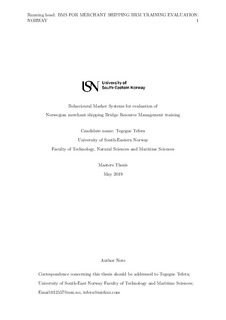Behavioural Marker Systems for evaluation of Norwegian merchant shipping Bridge Resource Management training
Master thesis
Permanent lenke
http://hdl.handle.net/11250/2637955Utgivelsesdato
2019Metadata
Vis full innførselSamlinger
Sammendrag
Human factors are fully or partially identified as the cause in 80 to 85% of all shipping
incidents and accidents. Stakeholders invested considerable effort to ensure safe
navigation and one of such efforts is Bridge Resource Management (BRM) training, an
adaptation of the Crew Resource Management training, that was introduced to the
aviation industry after a number of accidents in the 1970s.
International Maritime Organization mandated Bridge Resource Management
training for all officers serving aboard a ship and substantial amount of resources are
being spent; as a result, however, the instruments utilized to measure the effectiveness
of the training are not sufficiently reliable.
Behavioural Marker Systems proved effective to evaluate Non-technical skills
competency in aviation, operating theatres, nuclear facilities, and other safety-critical
industries.
The aim of this research is to
1. Identify behavioral markers that are relevant for Norwegian merchant shipping
bridge team Non-technical skills evaluation.
2. Establish their appropriateness by surveying for opinion of experts.
3. Calculate the relative importance of the identified behavioral markers.
The study has identified and shown that the Behavioural Marker Systems
extracted from literature are relevant for Norwegian merchant shipping and calculated
their relative importance.
